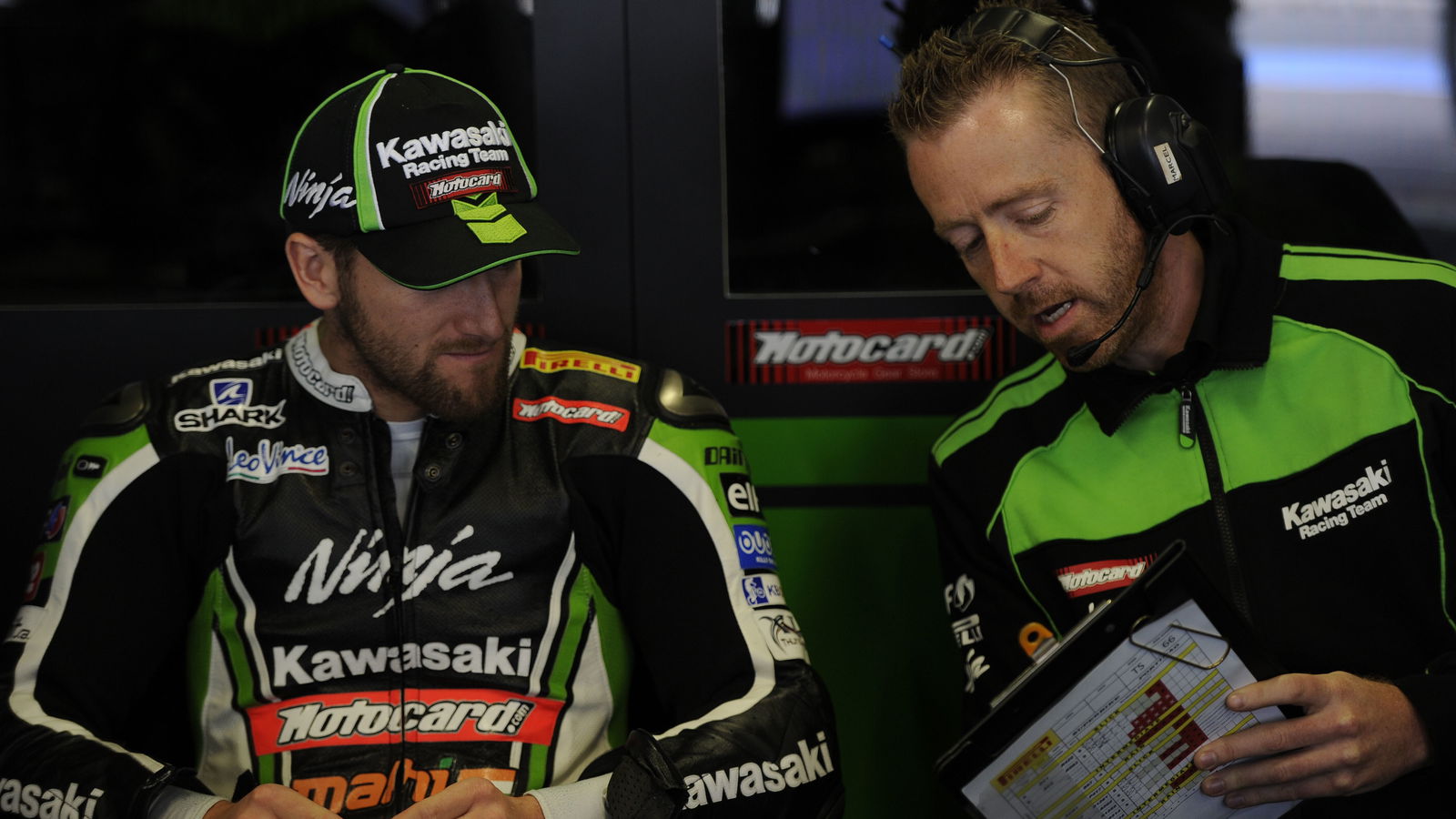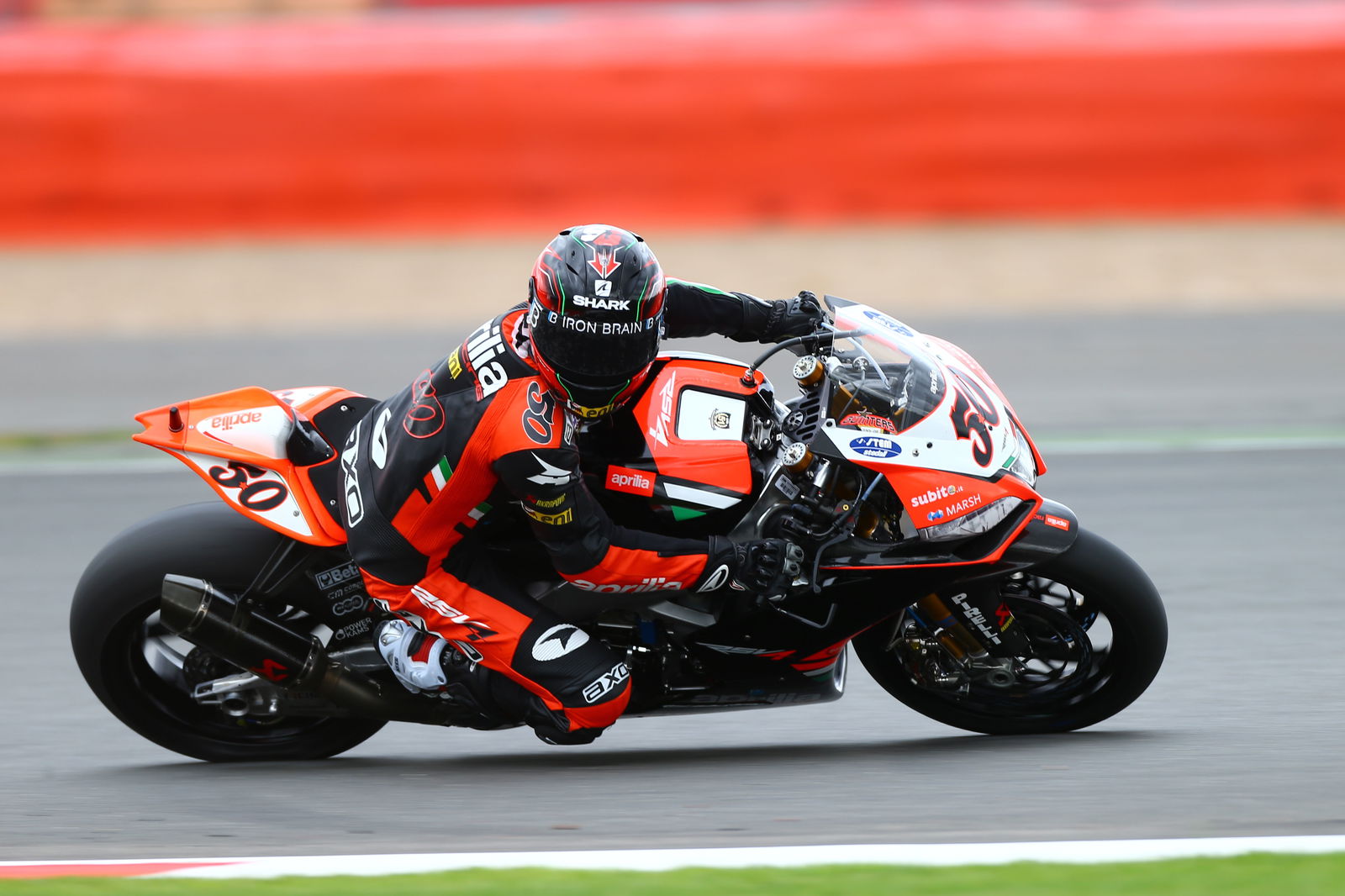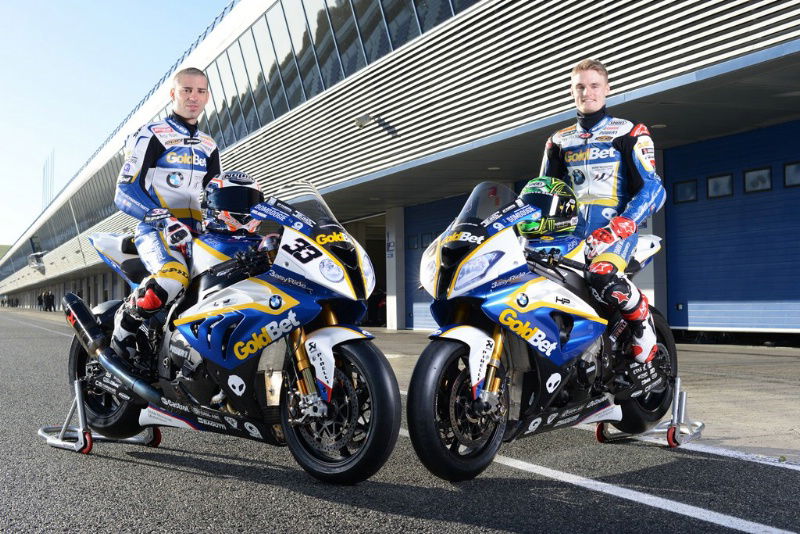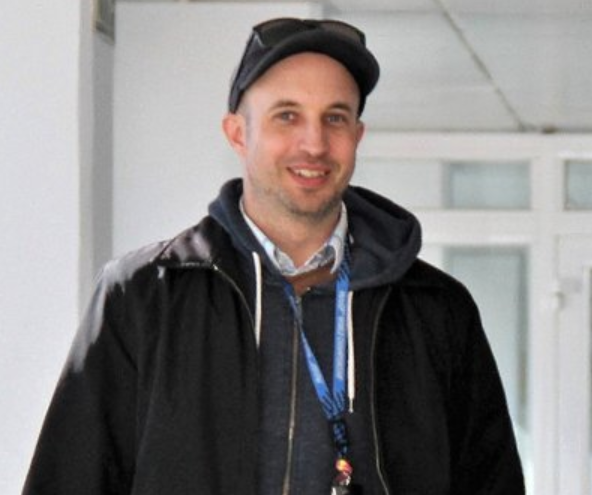Marcel Duinker (Tom Sykes' crew chief) - Q&A

By Christian Tiburtius
An exclusive interview with Marcel Duinker, crew chief for World Superbike title contender Tom Sykes at the Kawasaki Racing Team...
Crash.net:
Do you ride a motorbike?
Marcel Duinker:
I used to, my Dad had a Honda dealership for his whole life. I grew up on one of the islands in the north of Holland, my Dad had a dealership there and I grew up around motorcycles.
From my Dad's shop, when I was 18, I went to Honda Netherlands to work in their workshop for my school practice and the year afterwards Honda introduced me to 125 GPs. I was Aoki's mechanic and we won the title that year.
After that I went to study Automotive engineering and then joined the Ten Kate team. After a couple of other teams I then went to MotoGP in 2005 and I was in Ichiro Yoda's factory Kawasaki team for 5 years, including the Hayate season. There I had the role of suspension engineer.
I was never a racer, I just rode my bike on the road and sometimes did track days. I never felt the need to ride competitively and it's not something I'd like to do. I don't think I have any talent in that way. Also I have to say that any riding I did do doesn't help me in this job.
Crash.net:
Can you describe your role in this team?
Marcel Duinker:
I'm Tom Syke's crew chief. I don't touch the bike I just try to make sure that it is set up as well as possible. I'm the ultimate authority around Tom Sykes, I make the final decision. We've got a couple of mechanics, a couple of technicians, people for the electronics, engine, suspension and tyres who all have specific areas of expertise, but I make the final decision and I also have the final responsibility.
When the rider comes in from the track, various people may gather around them but the rider only speaks to me, I don't like there to be any confusion, if other opinions are expressed, then the rider starts to think about the wrong things, he just needs to think about his performance and feedback; I will decide what needs to be done. Anything else may lead to confusion and a confused rider doesn't open the throttle. This has got nothing to do with being selfish or egotistical, it's just how to manage the rider. I keep it one to one to avoid confusion and keep focus.
If something is needed from someone in the team then it will be me who asks. I have quite some experience in fields such as suspension and set up so those decisions will also come from me.
Next to me I have Danilo Casonato who is a very high level electronic engineer and I know that I can just let him do his job without any input. We've been sitting next to each other since 2005 and we don't even need to speak, sometimes we only exchange 5 words in a whole working day, our relationship is almost telepathic.
I'm also involved in the back of the garage because I have experience from some incredible environments such as a factory MotoGP team, which is an excellent place to grow in racing expertise.
When I was a suspension engineer in MotoGP I was working with some excellent crew chiefs. I always watched over their shoulder as to what I thought they were doing well and what not so well. I kept this analysis with me in case I became a crew chief in the future - I spent those years waiting, learning and analyzing. I learned a lot in those years and am putting that to use now.
One area in which the Kawasaki team contrasts with others is that we only have two people involved in the set-up of the bike, Danilo and myself, I believe that other teams have many more parties directly involved.
Ultimately I was one of the two lucky guys who moved to the Superbike project, the other was Danilo. Halfway through 2009 my Japanese boss, Mr Yoda [Kawasaki race director], said he'd like me to move to Superbikes so I knew where I was going quite early. It helped that I had a quite good personal relationship with Chris Vermeulen and he lived close to me in Belgium at the time, I was supposed to work with him.
I'm employed by Kawasaki directly.
Crash.net:
How long will you work today (Friday at the Silverstone WSBK round)?
Marcel Duinker:
Unfortunately today we destroyed a bike so it could be 11 or 12pm. I don't work as hard physically as the mechanics, my role is different, but I will always be there until the end. I am there until the last bolt is tightened and the engine is started. That is also part of my responsibility and then I can also be sure that everything is OK.
After the race, I fly home and they fly to the workshop, that's different, but on a race weekend it's like this.
Crash.net:
When you took over responsibility for the factory Kawasaki team from the previous team owner there was quite a jump in performance, why was that?
Marcel Duinker:
The bike we were using is the same physical machine, Kawasaki have consistently developed and improved it though.
I started working with Tom Sykes in the winter of 2011. As I mentioned I had at first been assigned to be Chris Vermeulen's crew chief but because of his injury I wasn't able to do my job properly - it was a shame. Even though I didn't have a specific job because of Chris' injury, I went to every race meeting and I was consistently monitoring and analysing how they were setting the bike up.
So once I started working with Tom I swept away the bike he was riding totally. I didn't use any historical settings from Tom's bike, I started from zero, from the settings of the bike when it was created. I didn't want to continue with a number of settings I didn't agree with. Because of my analysis I already had a great number of directions I wanted to work in.
The improvement came purely in the bike set up. I heard people often say that we must have got a new bike, but the hardware was the same. I believe that you firstly have to fully understand the problem before coming up with countermeasures and my analysis helped me to do that.
I have a very analytical approach and focus very much on the facts and numbers. If your experience as a crew chief isn't huge then you have to start somewhere and that is from the numbers, 2012 when I started to work with Tom was really my first year as a crew chief.
Now it's become a little different in that from the end of last year we had a proper base set up so now I can work more with my fingertips, just tweaking things as we go. Moscow and Silverstone are very different tracks but we can make small adjustments to that setting and we're already at 95%. Life is easier.
I also have to say that from day one, the relationship between Tom and I just worked.
Crash.net:
Another aspect that has improved is that Tom no longer fades at the end of the race...
Marcel Duinker:
If you start from zero, you don't have any history. We just didn't have any data from previous years to look back to. The problem was purely due to bike set up. We started from scratch and given that we arrived at Magny Cours and almost won the title, it's very difficult to accept the comment that Tom is fast at the beginning and then goes backwards.
You have to remember that at the start of the 2012 season we had a third at Philip Island, two seconds at Imola and after that we were consistently on the podium. That was already a big overachievement given our starting point, we didn't expect that so early, so to almost win the title at the end with a completely new team structure, new crew chief and new bike was a great success.
When our bike doesn't perform enough, the most important and difficult question is always: "are we missing turning or rear traction?" When the bike isn't turning enough you spend more time on the side of the tyre and this wears the rear tyre.
Also when the bike doesn't generate enough rear traction, again the bike doesn't turn enough and again you'll spend more time on the side of the tyre and reduce the rear tyre endurance. It was working on this equation which brought our improvement.
It wasn't a matter of how the rider manages the bike, not at all. Tom's riding style is actually very good as regards using the tyre because he uses the power of the bike well. He picks the bike up quickly and gets it fired out of corners, he uses the power of the engine and keeps it off the side of the tyre as much as possible and that is a proper Superbike style. You can only do that if the bike is set up properly though.
When he started fast and then got overtaken by other riders, it was only because the bike set up wasn't there yet and comes back to the fact that we started from nothing. Everyone points at the tyre or Tom's riding style but it was just that set up of the bike and the tyre wear was a symptom.
Crash.net:
As a technician, do you feel an attachment to the bike, is it 'your baby'?
Marcel Duinker:
No, the bike is just a tool. Of course, if there is a scratch on the chassis, I don't like to see it, if there is some wear in the finish somewhere I like to change it because I always like to give the rider the feeling that they've got the best material.
I am responsible for the technical side of things but I am also responsible for the mental side of the rider.
Crash.net:
So your responsibilities as a crew chief include intangibles such as the atmosphere in the pits?
Marcel Duinker:
When it comes to how the team works the environment in the garage is important. Aspects such as cleanliness in the garage contribute to a productive atmosphere. Another example is that I don't like to see mechanics run from the pit wall to the garage as this can give a feeling of confusion or stress. I really try to make the team run like a Swiss watch.
I don't want to see dirt on the floor, I want the rider to feel that they're in the best pits with the best looking bike and best team because the mental side of this sport is more important than the technical side. If the rider doesn't trust something in the crew chief, mechanics, bike or whatever then they don't open the throttle. If the bike is 95% and the rider is 100% confident then they can win but if the bike is 100% but rider is 95% confident then they can't.
Everything must be and look totally under control and that will communicate itself to the rider. Of course I'm the guy sitting next to him too and it will be me that he asks the questions so I have to contribute to that atmosphere by being a bit of a mental coach. Once again I have to say that the mental side of this sport is more important than the technical side.
Since I've been given the role of crew chief, I have always asked myself, 'What is the best way to manage a race weekend?' and my opinion is that right from the first day, I want to put the rider into race mode.
Right from the first lap on Friday I want the rider to be in race mode and getting as many laps in to find their limitations. It's important to not come into the garage after every lap but to consistently do a high number of laps so that you can get a valid picture. Every session for us is a race. In order to do this you need a good bike first, and having a good base setting has made this possible.
It's always a matter of the rider finding the limits of the bike and the circumstances and the only way to do that is to do as many laps as possible and not to change the bike too much because if you change too much, the rider is never able to find the limit and adapt. It's systematic and gradual.
I make my program on Thursday and that's what I expect will happen. Some things Tom will know about, some aspects about set up he doesn't need to. If you don't make a program, you can miss things.
I'm very self-critical person and don't like to put myself on a pedestal. Every day I feel that I could have done something differently or that I dropped the ball somewhere. I am not easy on myself and constantly like to improve.
Crash.net:
Is it important to you to get the fastest time in free practice?
Marcel Duinker:
Yes it is important, not for the race but for the rider. Mentally if he's in the number one position he feels strong and it's good for the rider's confidence. Also if they are near the limit, any feedback they give will be valid for the speeds they get up to in the race.
But I don't give a rider new tyres for the last 10 minutes of the session just to get a good time, that would be just fooling ourselves. Tom often does the overall best lap time on very used tyres anyway. That is the result of the rider getting used to the circumstances in combination with minor set-up changes. Every session we only use one set of tyres and treat it as a race simulation. The lap times are far more interesting after 16, 17 or 18 laps.
Crash.net:
How would you assess Tom as a rider?
Marcel Duinker:
He has some special ability, he's fast. He wasn't able to show it in the past in WSBK but now he can. He's also improving, he has improved while I've been working with him and he is still improving. I don't know where his limit is yet.
He has shown in some races and particular Superpole that he can leave the rest of the field behind.
One of his strengths is that he can really control all situations; a good example was in Magny Cours last season where we were fighting for the title. In wet conditions we were always struggling to find a proper set-up. But Tom managed to keep a chaotic situation under control to get the best result possible in the first race. When we then realised that we could win the title he went out and won the second race and managed it until the last lap.
If you were 13th the year before and then ride in that way in a crucial race, controlling it as he did, it means he can keep his head cool at all times.
Another strength is that he can always find the very limit of tyre traction. That in combination with his cool headedness means that he can find the limit of the bike in any conditions. He goes out and finds the limit of tyre traction straight away and that means that at the start of the race he can often find a large gap. He's shown that in many races, while other riders need to speed up, Tom's already on it.
When it comes to cooperation or how we work together Tom is probably the best rider I have ever worked with. We really clicked from day one and it has something to do with character. We laugh about the same things and we both laugh at our own jokes. In the past my relationship with riders wasn't real but with Tom it is, and by the way, I don't even have any problem with his accent.
I think our personal bond and intuitive communication has helped us get this level of performance.
Crash.net:
So you and Tom must spend a lot of time together?
Marcel Duinker:
No, we don't speak so much actually. I think that last year we created our system and how we manage the race weekend and now we don't need to speak so much. He knows what he has to do and I know what I have to do. After Thursday, everything will be clear and we know what to expect.
Crash.net:
You know that when Marco Melandri does well, the TV cameras show Manuela [his girlfriend] - and when Tom Sykes does well we see you!
Marcel Duinker:
(Laughs) That's why I like to see Marco doing well actually!
Crash.net:
And you always look very serious...
Marcel Duinker:
The camera is always on you and you don't know when it's recording, I don't look at the image all the time to see if they're recording me. Most moments when things are critical I'm concentrating very hard anyway. I may have a raised heart rate but I'm always checking the times and imagining scenarios that may happen and what countermeasures I can use to resolve them. I always try to be one step ahead.
Races are now not so tense though because working with Tom and getting these results has made it a lot more relaxed than the times when we were looking for results. Now it's a real pleasure to go to tests or race meetings, it's fun. I enjoy it.
It sometimes makes me a little emotional when people tell me how well we're doing. In MotoGP, it was nice and I was proud to be there but when you start getting these results at this level you feel very proud.
A journalist in Moscow actually told me that most riders think we are one of the best teams in the SBK paddock and I have to say that almost made me emotional because I didn't realise it. It really touched me, we've come a long way.








